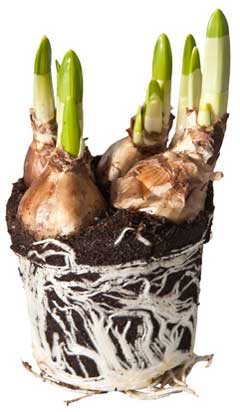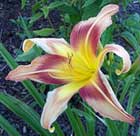- Gardening Tips |
- | What's NEW! |
- | Contact Us |
- | Sitemap
Bulbs and Rhizomes
Is there a difference between bulbs and rhizomes? Or are garden bulbs all the same?
If so, what is that difference? Here you'll find the answer ...
 Tulip Bulbs
Tulip Bulbs
Tulips and lilies come from bulbs. Iris come from rhizomes.
Both are bulbous types of underground storage organs that can practically clone themselves.
True bulbs, from which tulips and lilies come, are typically pear-shaped or oval. They are a complete plant in miniature.
In the middle of the bulb is the start of the flower itself. Working out from the middle, the scales of the bulb contain the nutrients which sustain the plant while dormant or at rest and also during the first stages of growth.
Finally on the outside is a thin papery skin that serves to help protect the scales.
Lilies are lacking this thin layer of protection so be careful and gently handle your lily bulbs.
Although sometimes referred to as bulbs, rhizomes from which iris come, are a bit different than true bulbs.
They are still a bulbous type of underground storage organ, yet the rhizome is actually a thickened stem filled with nutrients that support the growth of the plant.
 Dividing Iris Rhizome
Dividing Iris Rhizome
Rhizomes grow horizontally and spread outwards usually just below the surface of the soil. At the tip of the rhizome is the main growing point.
Other buds form along the top and sides of the stem portion and roots develop from buds on the underside of the rhizome.
And there you have it ... when discussing gardening bulbs and rhizomes, you now know that lily or tulip bulbs are true bulbs and that iris rhizomes are similar and yet a bit different.
Related Content:
To Top of this page on Bulbs and Rhizomes
Return to Gardening Tips Home Page
Gardening Updates
Note: We'd love you to send us your favorite garden pics to feature on our new pages!
Contact Us and we'll send you an email address that can accommodate your photographs.


